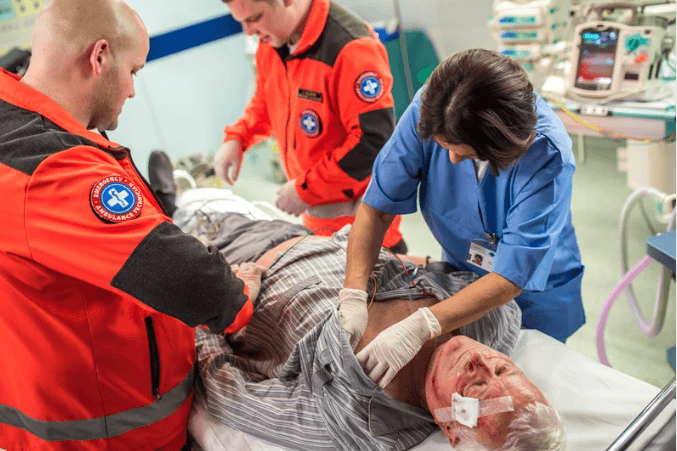Understanding Heart Attacks

Heart attacks are sudden and terrifying. When every second counts, knowing what to do can mean the difference between life and death. The American Heart Association strongly urges calling 911 instead of driving to the hospital. A study published in the Circulation Journal by the American Heart Association found that for every 30 minutes saved during a heart attack, the risk of dying within a year goes down significantly. The quicker you get treatment, the less heart muscle is damaged. Taking an ambulance can help get you the medical care you need much faster.
What is a heart attack?
A heart attack is a serious medical emergency that happens when one or more of the arteries supplying blood to the heart muscle become blocked. Without enough blood, the heart can’t get the oxygen it needs. And without oxygen, the heart can be permanently damaged.
Once you’ve had one heart attack and your heart is damaged, you’re at a higher risk for having another heart attack or other heart issues such as irregular rhythm, weaker pumping and further heart failure. Heart damage can make everyday activities hard. You might get tired easily or have trouble with exercise or even walking.
How does a heart attack happen?
The arteries that supply blood to the heart can become narrow over time because of a buildup of fatty substances called plaque. Sometimes, this plaque can crack, causing a blood clot to form. If the clot blocks the artery completely, the blood flow to part of the heart muscle is stopped, leading to a heart attack.
What are the symptoms?
Heart attack symptoms can vary from person to person, but common signs include:
- Chest pain or discomfort: This might feel like pressure, squeezing, fullness or pain in the center of the chest. It might last for several minutes or go away and come back.
- Pain in other parts of the body: Pain or discomfort can spread to the arms, back, neck, jaw or stomach.
- Shortness of breath: This can happen with or without chest discomfort.
- Cold sweat, nausea or lightheadedness: These symptoms can occur along with others or on their own.
Heart attacks can be different in severity and symptoms. Some are intense and sudden, while others might start slowly with mild pain or discomfort. Symptoms may be different for women, older people and people with diabetes.
Do what’s best
Heart attacks are one of the leading causes of death in the United States. But knowing what to do can change everything. Bottom line: If you or someone close to you is having heart attack symptoms, call 911. Don’t drive.

Tip: How to save money on interest while paying off credit card debt
By: Oregon State Credit Union
With recent increases in interest rates, credit card debt is increasing at rates not seen in decades. Consolidation can be a wise move to save money on interest while trying to pay down debt. One little-known way to accomplish this at a competitive rate is a car equity loan. If you have a vehicle that’s paid off, or you owe less than it’s worth, you can get the equity as cash back! Use this to pay down high-interest debt while having the benefit of the lower interest rate that comes with a car loan.



